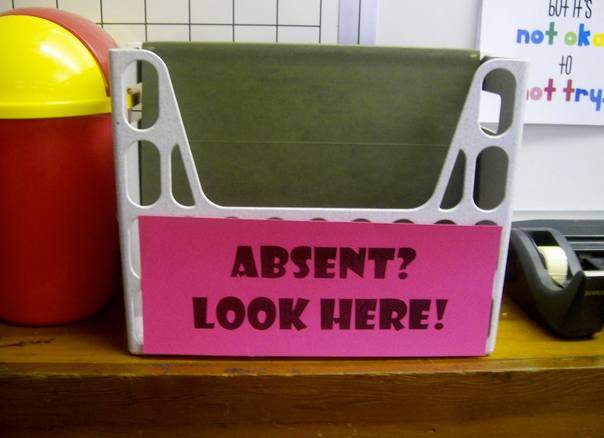The trash can sign is based on an actual sign used by a colleague of mine, and the philosophy that I embraced under her guidance (though I never used the sign). I told students that part of my job was to help them learn to be responsible and so if I allowed work to be turned in late, I was encouraging them to be irresponsible.
Now, I look back and think that those two policies were really bad ideas. In fact, I believe that they caused me MORE work, and harmed my students and the relationship I had with them. The difference is that now I approach planning class through the lens of ways in which I can get students to be responsible for their own learning, and how I can help them gain the skills and knowledge they need to be critical readers, writers, and thinkers. Through that lens, I can't justify either practice.
I still do keep a version of the "Absent Binder" but it's pretty different now. Everything we do in class is available for students, whether through a screencast, a link to a secondary resource, pictures of my notes and what was written on the board, instructions for assignments, etc. When I've done explanations to a small group in class, I've even recorded it using ShowMe or on my laptop with Camtasia and then posted it for the entire class. When I read aloud in class, I record myself and post it to YouTube, or to Evernote through my LiveScribe pen.
All of that is curated into a MentorMob playlist, and posted on my class website. If you want to see what that looks like, here is the weekly blog where I post all of this. What that means is that my students have access to our coursework any time, and anywhere they have an internet connection. That's not quite the same as being in class where I can give individual differentiated instruction, but it means that I leave the door of opportunity open instead of slamming it shut in their face.
I also accept any work until the end of the grading term. And if they aren't happy with the level of mastery they demonstrated, I also accept revised work until the end of the grading term. The only exceptions are assignments not entirely linked to a useful skill or standard - those I often will just excuse. And frankly, those are pretty rare anyway.
The point is this: if I assign it, then the skills are important. If the skills are important, then why am I attaching an arbitrary time limit?
The answer to that question is "because it's a lot more work to grade work when it comes in, rather than when it's due." As an English teacher with California class sizes, I totally get teachers who push back and say they won't accept late work because of how much work it can be. Last year, I had six preps and 310 students. I know it's difficult. But I also know it's possible.
Part of what makes it more doable for me is that I have a system for checking work. When students are turning in an assignment after I originally collected it, I ask them to do the following:
- If it is on paper, they need to attach it to their most recent progress report with the assignment highlighted.
- If it is digital, they add it to their MentorMob playlist and send me an email with the link to that step.
For the paper assignments, I have a special coloured box to put them in until they are processed. For digital assignments, I just add a label in gmail to designate it as late work and it gets filed in a folder until it's processed. Both systems require little maintenance and a significant amount of effort on the student's part. As it should be.
It means that I never have to explain to a parent why a student has to make something up, or how to complete it. It means that no student can ever say "I didn't understand how to do it" or get out of it because they lost the assignment instructions. It means that the focus is now on what they learned and produced, rather than just what we did or turned in. Any assignment questions start with this:
- Did you read the instructions?
- Did you see the [resource/example/instructions] posted on my website?
I can't tell you how much time that has saved me. And it reinforces the idea that students are the ones that need to be responsible for their learning.
Frankly, this system does more to build community, student knowledge and skills, and make my students responsible for their own learning than a binder and trashcan ever could.




 RSS Feed
RSS Feed
